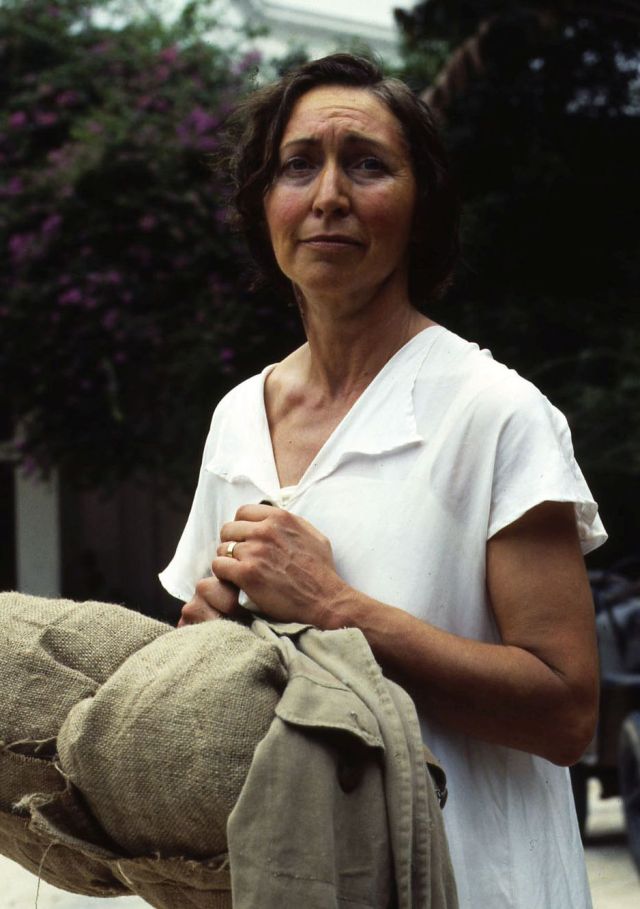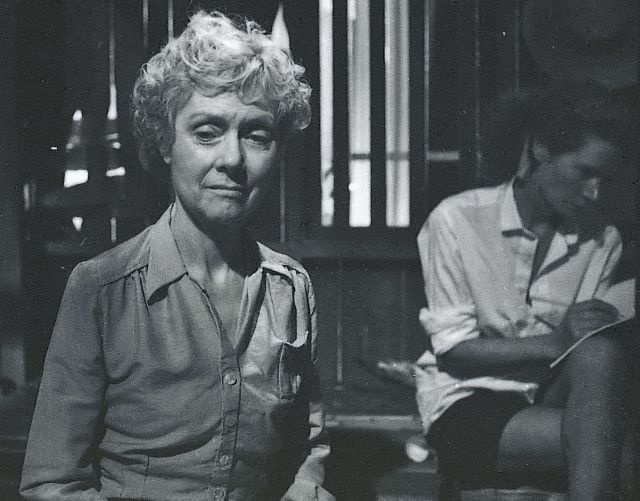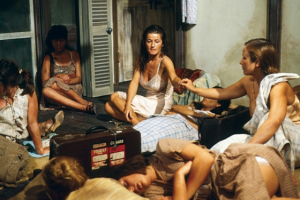 I am saddened to report that Jill Hyem, who wrote more Tenko than anyone else, died last Friday. She had been stoically battling cancer for several years. I had the great pleasure to personally get to know her well as in 2013 she asked me to collate her life’s work as both an actress and a writer in the form of a physical and digital archive which was gifted to the British Film Institute earlier this year. The following is my obituary for Jill which will hopefully makes its way in whole or in part to national newspapers in due course and seeks to summarise her many talents, her vitality, and her legacy: an incredibly creative and wide-ranging contribution to the fields of television and radio.
I am saddened to report that Jill Hyem, who wrote more Tenko than anyone else, died last Friday. She had been stoically battling cancer for several years. I had the great pleasure to personally get to know her well as in 2013 she asked me to collate her life’s work as both an actress and a writer in the form of a physical and digital archive which was gifted to the British Film Institute earlier this year. The following is my obituary for Jill which will hopefully makes its way in whole or in part to national newspapers in due course and seeks to summarise her many talents, her vitality, and her legacy: an incredibly creative and wide-ranging contribution to the fields of television and radio.
Jill Hyem, who has died aged 78, was an actress and writer who co-created the popular radio serial Waggoner’s Walk, and later became a prominent writer of television drama, best known for co-writing the highly successful BBC series Tenko (1981-85) about the wartime experiences of women prisoners of the Japanese. Despite Tenko’s grim setting and almost entirely female cast, both of which were initially considered to be to its detriment, over three series Jill and her co-writer Anne Valery, in collaboration with Tenko’s creator Lavinia Warner, defied all expectation by delivering one of the most watched dramas of the decade, peaking at 16.75 million viewers. In Tenko, Jill felt that she had struck gold: “Anne and I could not have had a better opportunity, not only to develop the characters over their three years in the camps, but also to examine in depth some of the taboo subjects of the time, as well as the feminist aspects of the series.” Jill was a writer first and a feminist second, but always fought against what she called “unconscious male censorship of her work,” referring to those instances where she found the scenes she had written had been softened or her dialogue termed “unfeminine.” Specifically, during Tenko she remembered fighting to retain a scene between two women that she had set in the camp’s makeshift latrine. While she lost that particular battle and the scene was moved to the more ‘acceptable’ environment of the cookhouse, she was to win a more significant fight to retain a storyline featuring a lesbian relationship which the producer had feared might offend some of the audience. The episode in question remains one of Tenko’s most accomplished fifty minutes. Jill had a bellicose turn of phrase, and enjoyed talking of her many “battles and skirmishes over scripts” which she considered to be an everyday eventuality of working in the male-dominated world of 80s television. However, Jill was never just fighting for fighting’s sake, rather she was determined to seek out the truth and integrity of a script, character, or situation. Her overriding ambition was for proper recognition of women as writers, and an appreciation that they could bring more to a script than just “a feminine touch.”
 After Tenko, Jill penned the opening episodes of such enduring favourites as family sailing drama Howards’ Way (1986-90) and Twenties costume drama The House of Eliott (1991-94), thereby creating characters and settings which the viewing public came to know and love. She was reunited with Tenko’s Lavinia Warner on London Weekend Television’s popular wartime drama Wish Me Luck (1988-90) about female SOE agents operating behind enemy lines (left). The pair, who became firm friends, created the series together, while Jill wrote the scripts. Jill also contributed to many popular series of the day such as nursing drama Angels, Wendy Craig’s Nanny, Margery Allingham’s Campion, and Miss Marple with Joan Hickson. Her writing received two BAFTA nominations, one for Tenko and another for the 1993 drama Body and Soul.
After Tenko, Jill penned the opening episodes of such enduring favourites as family sailing drama Howards’ Way (1986-90) and Twenties costume drama The House of Eliott (1991-94), thereby creating characters and settings which the viewing public came to know and love. She was reunited with Tenko’s Lavinia Warner on London Weekend Television’s popular wartime drama Wish Me Luck (1988-90) about female SOE agents operating behind enemy lines (left). The pair, who became firm friends, created the series together, while Jill wrote the scripts. Jill also contributed to many popular series of the day such as nursing drama Angels, Wendy Craig’s Nanny, Margery Allingham’s Campion, and Miss Marple with Joan Hickson. Her writing received two BAFTA nominations, one for Tenko and another for the 1993 drama Body and Soul.
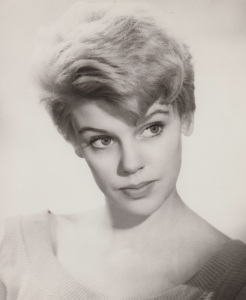 Jill was born in Putney but spent most of her childhood “running wild” on the edge of Dartmoor. Remembering these idyllic days playing war games with her boy cousins Dan and Chris, she recounted that she simply hadn’t realised that she was a girl: “the inequality of my gender was only gradually revealed.” When asked what she wanted to be when she grew up, the young Jill confidently replied: “I’m going to be an actress first, and in my old age I shall be a writer.” And so it came to pass, although, as she would later comment, “my ‘old age’ came rather earlier than anticipated.” After boarding school in Sussex – where she began a Resistance Movement which saw her put unhappy girls on trains home, but later redeemed herself by becoming Head Girl – Jill attended the Webber-Douglas Academy of Dramatic Art. There she recalls: “I spent two very happy years learning to fence, faint, slap faces, breathe, project, weep, laugh hysterically and all the other skills an actor needs.” Her subsequent work in rep led to her first television roles and parts in several ‘second feature’ films, “playing an assortment of nurses, air-hostesses, dreary daughters, gangster’s molls and French maids, the fodder for young actresses in those days,” many of which were produced by the Danziger brothers in about a fortnight.
Jill was born in Putney but spent most of her childhood “running wild” on the edge of Dartmoor. Remembering these idyllic days playing war games with her boy cousins Dan and Chris, she recounted that she simply hadn’t realised that she was a girl: “the inequality of my gender was only gradually revealed.” When asked what she wanted to be when she grew up, the young Jill confidently replied: “I’m going to be an actress first, and in my old age I shall be a writer.” And so it came to pass, although, as she would later comment, “my ‘old age’ came rather earlier than anticipated.” After boarding school in Sussex – where she began a Resistance Movement which saw her put unhappy girls on trains home, but later redeemed herself by becoming Head Girl – Jill attended the Webber-Douglas Academy of Dramatic Art. There she recalls: “I spent two very happy years learning to fence, faint, slap faces, breathe, project, weep, laugh hysterically and all the other skills an actor needs.” Her subsequent work in rep led to her first television roles and parts in several ‘second feature’ films, “playing an assortment of nurses, air-hostesses, dreary daughters, gangster’s molls and French maids, the fodder for young actresses in those days,” many of which were produced by the Danziger brothers in about a fortnight.
It was the experience of playing in a lengthy run of the play Goodnight Mrs Puffin with Irene Handl in the West End, in which she was reduced to saying “Oh Mummy, don’t upset yourself,” and “Oh Mummy, please keep calm,” night after night, that Jill realised: “my mission in life would be to write challenging parts for women.” However, advice received from the BBC Radio Script Department was to: “Never write more than two women in a scene. They catch each other’s tone.” Her typically defiant response was to go away and write a play with six women characters and just one man, which was duly bought.
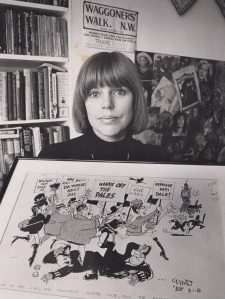 She elected to leave acting behind after beating Tom Stoppard, no less, to the role of new writer on the long-running radio soap The Dales, formerly Mrs Dale’s Diary. Jill wrote countless episodes including its finale in 1969, and its replacement, the long-running and highly popular serial Waggoners’ Walk (1969-80) which she created with Alan Downer. While writing Waggoners, which gave her the financial security she needed as a wife and mother, Jill had the time to write many one-off radio plays for the BBC and hone her craft. Stand-out plays included: the beautifully sparse A Shape Like Piccadilly (1971) about illiteracy; Equal Terms (1973) which concerned the intrusion of a home help; and the critically acclaimed lesbian love story Now She Laughs, Now She Cries (1975). Jill also loved to write suspense, and won the Giles Cooper Award for Best Radio Play of 1978 for Remember Me, a disturbing tale of a woman scorned.
She elected to leave acting behind after beating Tom Stoppard, no less, to the role of new writer on the long-running radio soap The Dales, formerly Mrs Dale’s Diary. Jill wrote countless episodes including its finale in 1969, and its replacement, the long-running and highly popular serial Waggoners’ Walk (1969-80) which she created with Alan Downer. While writing Waggoners, which gave her the financial security she needed as a wife and mother, Jill had the time to write many one-off radio plays for the BBC and hone her craft. Stand-out plays included: the beautifully sparse A Shape Like Piccadilly (1971) about illiteracy; Equal Terms (1973) which concerned the intrusion of a home help; and the critically acclaimed lesbian love story Now She Laughs, Now She Cries (1975). Jill also loved to write suspense, and won the Giles Cooper Award for Best Radio Play of 1978 for Remember Me, a disturbing tale of a woman scorned.
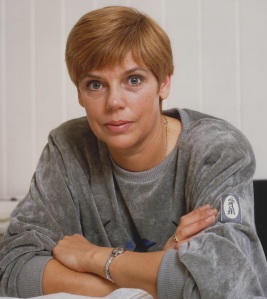 Jill wrote 40 radio plays during her career, the last in 2007, and always described radio as her favourite medium: “It combines the intimacy of the novel with the freedom of film. Above all, it requires the creative participation of the listener. Their imagination is challenged just as the writer’s is.” However, she was grateful for her transition into television, following the unexpected axing of Waggoners’ Walk, which had been paying the mortgage of the recently divorced Jill, now a single parent to her son Ben. Tenko fell into her lap at just the right moment and “catapulted me into the forefront of television.” As well as taking great pride in developing the series’ characters, Jill had huge admiration for the commitment of the actresses, “all prepared to lose weight and look their worst,” with whom she developed lasting friendships, and who became important cast members in her own life.
Jill wrote 40 radio plays during her career, the last in 2007, and always described radio as her favourite medium: “It combines the intimacy of the novel with the freedom of film. Above all, it requires the creative participation of the listener. Their imagination is challenged just as the writer’s is.” However, she was grateful for her transition into television, following the unexpected axing of Waggoners’ Walk, which had been paying the mortgage of the recently divorced Jill, now a single parent to her son Ben. Tenko fell into her lap at just the right moment and “catapulted me into the forefront of television.” As well as taking great pride in developing the series’ characters, Jill had huge admiration for the commitment of the actresses, “all prepared to lose weight and look their worst,” with whom she developed lasting friendships, and who became important cast members in her own life.
Several of Jill’s radio plays were adapted for the theatre in the 80s and it was a medium she would return to later in life, when as well as being commissioned to adapt Lorna Doone, she was pleased to receive critical acclaim for her last original play We’ll Always Have Paris which was performed at The Mill at Sonning in 2010.
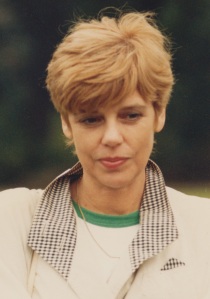 Jill was an active member of the Writers’ Guild of Great Britain. During the 80s and 90s she served on the Executive Council for several terms, and was Deputy Chair to Alan Plater. Along the way she also chaired the Radio and Anti-Censorship committees. More controversially she also co-founded, with Sheila MacLeod, a Women’s Committee which “hoped to encourage more women writers to become active in the Guild at a time when most of the committees were male-dominated and many of the areas of special concern to women were neglected.” The committee folded after a decade, deemed no longer necessary, as by that time women were represented throughout the Guild and also worked across the industry. Jill was made an Honorary Member of the Guild in 2007.
Jill was an active member of the Writers’ Guild of Great Britain. During the 80s and 90s she served on the Executive Council for several terms, and was Deputy Chair to Alan Plater. Along the way she also chaired the Radio and Anti-Censorship committees. More controversially she also co-founded, with Sheila MacLeod, a Women’s Committee which “hoped to encourage more women writers to become active in the Guild at a time when most of the committees were male-dominated and many of the areas of special concern to women were neglected.” The committee folded after a decade, deemed no longer necessary, as by that time women were represented throughout the Guild and also worked across the industry. Jill was made an Honorary Member of the Guild in 2007.
In her final years, Jill was brutally honest about what she described as “my demise” – she had been fighting breast cancer since 2011 – and although she no longer possessed the concentration or energy to write, she still saw the potential for drama scripts all around her, the last being for a comedy set in a palliative care centre where the most unlikely people came together from all walks of life, an experience she enjoyed more than one might expect. Jill was a vocal supporter of many causes during her life, and she would not have wanted to miss the opportunity here to mention the one she was the most passionate about: the Voluntary Euthanasia Society, now called Dignity in Dying.
Jill’s friends and collaborators will miss her integrity, her wit and wisdom and, of course, her gift for storytelling. She is survived by her son Ben, his Vietnamese wife Vy and their two young children Jaden and Gaia.
Jill Hyem, born 8th January 1937, died 5th June 2015.
Andy Priestner



 After several years of Cato being described as ”my little yellow friend”, Burt was asked whether or not he was buying in to the underlying racism and stereotyping that beset the entertainment industry at the time. His reply: “They can call me anything they like as long as I get paid and my name is spelt correctly”. With few Asian actors around, and fewer with the breadth of experience and ability as Burt Kwouk, it is hardly surprising that his career took off and he became so well known.
After several years of Cato being described as ”my little yellow friend”, Burt was asked whether or not he was buying in to the underlying racism and stereotyping that beset the entertainment industry at the time. His reply: “They can call me anything they like as long as I get paid and my name is spelt correctly”. With few Asian actors around, and fewer with the breadth of experience and ability as Burt Kwouk, it is hardly surprising that his career took off and he became so well known.
 In a career of extremes, Tenko was Kwouk’s big break into “serious” television drama, and served to seal his reputation as a great character actor. After Tenko, he made guest appearances in TV staples such as Howards Way, Boon, Silent Witness and many more. His comedy performances continued, with a long stint in Last of the Summer Wine, playing Entwhistle, who came “from the East”. (i.e. Hull).
In a career of extremes, Tenko was Kwouk’s big break into “serious” television drama, and served to seal his reputation as a great character actor. After Tenko, he made guest appearances in TV staples such as Howards Way, Boon, Silent Witness and many more. His comedy performances continued, with a long stint in Last of the Summer Wine, playing Entwhistle, who came “from the East”. (i.e. Hull).









